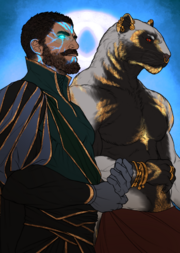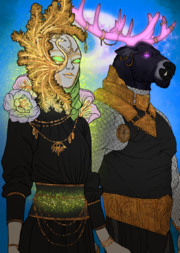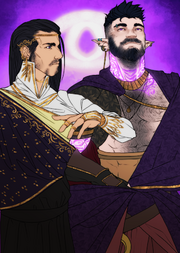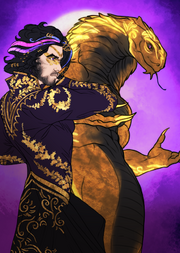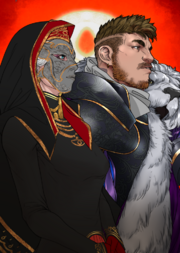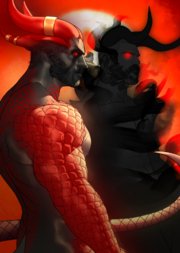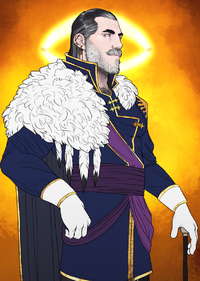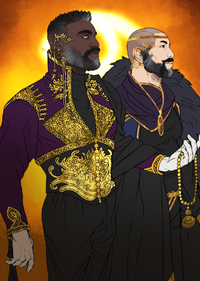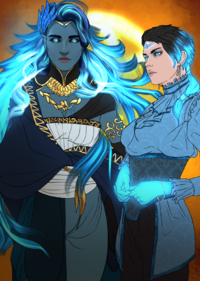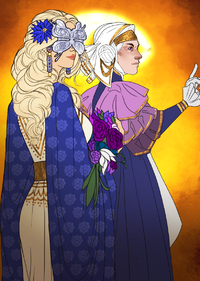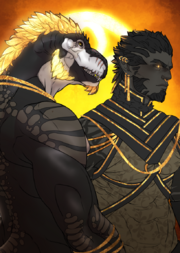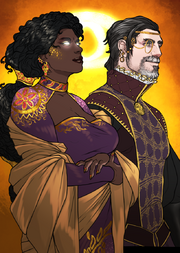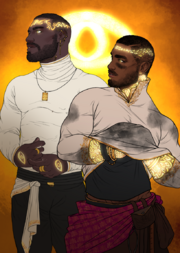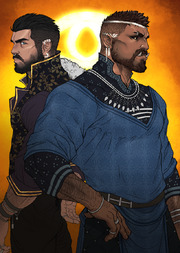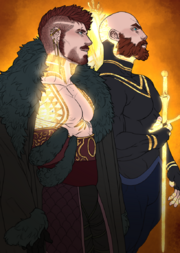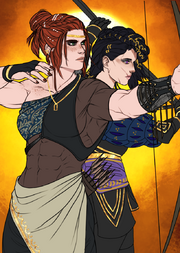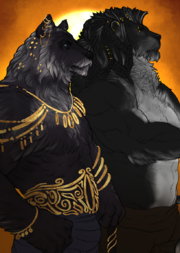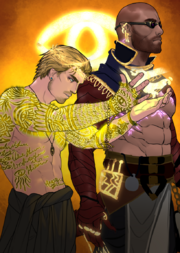|
|
| Line 387: |
Line 387: |
|
| |
|
| =ColumnTest2= | | =ColumnTest2= |
|
| |
| ==Neall & Nolven, the Cultured==
| |
| {| class="wikitable" style="margin:left; width: 100%"
| |
| |- style="background:#FFD700"
| |
| | ||
| |
| |-
| |
| | style="width: 1%" | [[File:Artgods.png|180px|caption|]] || '''Neall and Nolven are the Culture Gods of Unionism, the teachers of the facets of culture in peace and war, and in loving art.'''
| |
| * Neall (left) is the Joined God of Visual Arts, and the twin brother of Nolven, who was once a God to a now forgotten Religion.
| |
| * Nolven (right) is the Joined God of Martial Arts, and known to sire Godborn, and was also a God to a now forgotten Religion.
| |
| * The Culture Gods' Golden Lesson is that culture and art fill the soul with light, and that even in the darkness of war is beauty, and that sin is pure blind hatred without grace or beauty.
| |
| * The Temple of High Arts is the holiest site to the Culture Gods.
| |
| * The Culture Gods are the patrons of Painters, Sculptors, Make-up Artists, Fashion Designers, Gardeners, and Designers.
| |
| * Both Neall and Nolven joined the Pantheon during the conquests of Allestrain I.
| |
| |-
| |
| | colspan="2" |
| |
| <span class="mw-customtoggle-Art" style="color:#0645AD"><u>For expanded lore, click here.</u></span>
| |
| <div class="mw-collapsible mw-collapsed" id="mw-customcollapsible-Art">
| |
| <div class="mw-collapsible-content">
| |
| '''Description'''<br>
| |
| Neall (left) and Nolven (right) are the Culture Gods of Unionism, the teachers of the facets of culture and art, both in times of peace and war. Neall (left) is the Joined God of Visual Arts, while Nolven is the Joined God of Military Arts. Together, the Culture Gods represent creativity, artistic expression, gregariousness, welcomeness, inclusivity, and visuals. They are represented by Neall's golden paintbrush/pencil, and Nolven's golden sword. Their main holy place is the Temple of High Arts, which serves as the Imperial Art Gallery. Rituals of the Culture Gods involve the combination of cultural beauty and the art of war, whether that is a dramatic renaissance-style painting of a battlefield, or finding ways to depict what is in essence militarist propaganda in beautiful ways (statues, poetry, literature, art, etc). Because art is a skill, most worshipers of Neall and Nolven tend to perform their worship by paying artists to make art, a form of patronage.
| |
|
| |
| '''Virtues'''<br>
| |
| The Virtue of the Culture Gods is to find the beauty in all aspects of life, through cultural and artistic expressions. Unionists believe that art is a way to fill the soul with the Everwatcher's divine light, and often decorate their holy spaces with stained glass, chiseled statues, and ironic paintings. The Culture Gods also preach about the beauty which can be found in war. While the battlefield can often be seen as a bloody hellscape void of emotion, it is also the place where great heroic feats are performed that pass into song and legend, and well-planned strategies are executed with precision. It is thus a virtue to always seek the positives in every situation, and find the beauty in even the most mundane of things, as often there is a divine order to all things.
| |
|
| |
| '''Vices'''<br>
| |
| The greatest Vice against the Culture Gods is barbarism, and the blind hatred of things. To lash out against the world without grace or beauty is to be no different from a wild beast, fueled off of primal instinct and lacking true sentience. To give in to one's primal urges is to cast aside one's humanity, and thus fall astray from carrying out the Great Way. Even when emotions run high, Unionists are reminded to demonstrate a sense of grace in their setbacks, and to understand that such obstacles are simply part of life's process. Failure is bound to occur, as nobody creates a masterpiece the first them they start something. To rage against one's misfortunes is to lack the ability to grow, and thus become an animal lacking any culture.
| |
|
| |
| '''Legacy'''<br>
| |
| Neall and Nolven are Joined Gods, meaning they were once the Gods of a tribe whose name has been lost to time. They are also unique in that the Covenant College declared them as Duo-Gods decades before the concept was adopted by the Emended and later Guided Unionists. Neall is generally seen as a reserved as shy God, more focused on his artistic pursuits, while Nolven as a war God is more gregarious and prone to carnal desires. It comes to no surprise that Nolvan is one of the Unionist Gods who sires Godborn, who are often expected by Unionists to represent their divine father and uncle's pursuits of cultured warriors.
| |
| </div>
| |
| </div>
| |
| |}
| |
|
| |
| ==Elia & Leona, the Protectors==
| |
| {| class="wikitable" style="margin:left; width: 100%"
| |
| |- style="background:#FFD700"
| |
| | ||
| |
| |-
| |
| | style="width: 1%" | [[File:LESBIANS.png|180px|caption|]] || '''Elia and Leona are the Protector Goddesses of Unionism, the teachers of the faithful to guard one another and be responsible for one another.'''
| |
| * Elia is the God Empress of the Watchful Gaze, serving in life as Empress Eolaria Brunig to Emperor Allestrain I.
| |
| * Leona is the Called Goddess of Knights, serving in life as the protector and lover of Empress Eolaria, and wife to Arch-Chancellor Alexander the Giant.
| |
| * The Protectors' Golden Lesson is that responsibility and protecting society is shared by everyone, no one can be excused, and that sin is to indifferent and not watching for the dangers of the world.
| |
| * The Temple of Unyielding Overwatch is considered the holiest site to the Protector Goddesses.
| |
| * The Protectors are the patrons of Guards, Knights, Hunters, Rangers, Explorers, Scribes, and Lesbians.
| |
| * Elia ascended to the Pantheon upon her death, whereas Leona was not recognized until the Emended Unionists declared her a Goddess.
| |
| |-
| |
| | colspan="2" |
| |
| <span class="mw-customtoggle-Knight" style="color:#0645AD"><u>For expanded lore, click here.</u></span>
| |
| <div class="mw-collapsible mw-collapsed" id="mw-customcollapsible-Knight">
| |
| <div class="mw-collapsible-content">
| |
| '''Description'''<br>
| |
| Elia (left) and Leona (right) are the Protector Goddesses of Unionism, the guardians of the faithful, and promoters of responsibility towards others. Elia is the God-Empress of the Watchful Gaze, and Leona is the Goddess of Knights, and was a Goddess to the Emended and later Guided Unionists, before being incorporated to the unified Pantheon in recent times. Together, the Protector Goddesses represent chivalry, alertness, mindfulness, responsibility, dedication, precision, and awareness. They are represented by Elias's Longbow and Leona's Sword, with Blacksteel in general representing the strength and durability required of defenders of the faith. Their main holy place is the Temple of Unyielding Overwatch, otherwise known as the Imperial Hunting Lodge on the Crown Isle. Rituals belonging to the Protector Goddesses involve some kind of communal or co-operative practice of the hunt or respect and support of the Knights (as well as being Knights). Knighthood is considered the greatest form of "keeping watch over society", and so many of their patrons become Knights. Other forms of rituals are couple or group hunts, and inspections of garrisons and walls and armories.
| |
|
| |
| '''Virtues'''<br>
| |
| The Virtue of the Protectors is to be responsible for society as a whole, and to protect those around you. As the world is a dangerous place, and enemies of Unionism are ever present, it is the duty of all faithful to remain vigilant for such threats, and be ready to take up the call to protect all that they cherish. It is important to emphasize that this duty is not only for those martially inclined, as the Protectors preach for everyone to contribute what they can, be it a baker providing bread for a knight, or a street sweeper ensuring that the roads are able to be traversed quickly in an emergency. By watching out for one's fellow citizen, they in turn will watch out for you, ensuring that society as a whole is well protected and cared for.
| |
|
| |
| '''Vices'''<br>
| |
| The greatest Vice against the Protectors is to be apathetic and uncaring to the world around them. As Unionists are expected to further the Great Way by doing their part to bring about Paradise, the act of general apathy not only impedes the Great Way, but might also hinder the duties of fellow citizens. For example, a farmer that decides not to harvest grain for the day prevents the miller and baker from producing the bread for the village, causing everyone to go hungry due to the laziness of one person. Likewise, a careless disregard to the dangers of the world invite even greater calamities upon those who were not prepared. As such, the Protectors emphasize the need for Unionists to pull their weight and contribute to society as a whole, while also remaining ever vigilant and prepared for any emergency that arises in the future.
| |
|
| |
| '''Legacy'''<br>
| |
| In Life, Elia was known as Eolaria Brunig, Empress to Allestrain I, while Leona was married to Arch-Chancellor Alexander I. As mentioned previously, both marriages were public fronts to placate the demands of an Emperor to have an Empress. Eolaria was a fierce warrior, but fought more so for personal glory and to train the common soldier, rather than Allestrain and Alexander's ambitions for territorial expansion. Leona was the silent supporter of her lover's work, caring for the Empress when she was injured, and taking hits for Eolaria who was not paying attention, suffering through them. Both women would outlive their spouses, with Eoalaria continuing to fight in a few minor campaigns as the Dowager Empress alongside Leona. When Eolaria died after years of sustaining battle wounds, the Covenant Council declared her ascension to the Pantheon as God Empress Elia. Leona would retire to the Thousand Blade Monastery following the death of the true love, maintaining a silent vigil and training the next generation of knights. Following her death, the Emended and later Guided Unionists would declare her a Goddess in her own right, before recent times saw her paired with Elia in the Pantheon.
| |
| </div>
| |
| </div>
| |
| |}
| |
|
| |
| ==Mendes & Hor, the Prosperous==
| |
| {| class="wikitable" style="margin:left; width: 100%"
| |
| |- style="background:#FFD700"
| |
| | ||
| |
| |-
| |
| | style="width: 1%" | [[File:Furrygods.png|180px|caption|]] || '''Mendes and Hor are the Prosperity Gods of Unionism, blessing the people with wealth and prosperity and good wit in commerce.'''
| |
| * Mendes (left) is the Joined God of Prosperity, and was once the God of a small Asha Cult called the Golden Mask.
| |
| * Hor (right) is the Called God of Wealth, and served as Mendes's longtime friend and bodyguard.
| |
| * The Prosperity Gods' Golden Lesson is that wealth is there to be shared, but ultimately needed for the greatness of the faith, and that sin is to hoard wealth alone, and to steal from others.
| |
| * The Regalian Central Bank and Exchange is considered the holiest site to the Prosperity Gods.
| |
| * The Prosperity Gods are the patrons of Merchants, Bankers, Traders, Shopkeepers, and Bureaucrats.
| |
| * Mendes joined the Patheon when his divinity was proven by turning an infertile landscape into fertile farmland, whereas Hor ascended to the Pantheon after protecting several Unionist relics from robbery.
| |
| |-
| |
| | colspan="2" |
| |
| <span class="mw-customtoggle-Money" style="color:#0645AD"><u>For expanded lore, click here.</u></span>
| |
| <div class="mw-collapsible mw-collapsed" id="mw-customcollapsible-Money">
| |
| <div class="mw-collapsible-content">
| |
| '''Description'''<br>
| |
| Mendes (left) and Hor (right) are the Prosperity Gods of Unionism, the bringers of wealth and fortune, and instructors of financial wit. Mendes is the God of Fortune, able to grants boons to the faithful by giving them business acumen and blessing the lands to produce plentiful bounty. Hor is the God of Wealth, and serves as Mendes's bodyguard to ensure that the fortunes of Unionism are not squandered or stolen by enemies of the faith. Together, the Prosperity Gods represent business acumen, opulence, responsibility, self-sufficiency, insight, and bounty. They are represented by the Golden Coins of Union, which are coins with the Eye of the Everwatcher in place of the Emperor's profile. Their main holy place is the Regalian Central Bank and Exchange, which houses most of the Empire's gold reserves. One of the most common forms of worship to Mendes and Hor is paying taxes. The act of paying taxes is considered virtuous, because it both shows a willingness to part with wealth, and a willingness to trust the State to do good by the people with said Taxes, and to contribute to communal greatness. Other rituals involve squeezing foreigners for money and signing unequal trade treaties with foreign merchants, to encourage them to join the Empire and share in its prosperity.
| |
|
| |
| '''Virtues'''<br>
| |
| The Virtue of the Prosperity Gods is to share the wealth accumulated through one's actions. Not only does the pooling of money allow society to fund large projects which benefit everyone as a whole, but it also demonstrates the greatness of the Unionist faith, as worshippers are willing to part with their personal gains to benefit their fellow citizens. The giving of alms to the poor and donating to various charity organizations is a common practice for Unionists, as if the most destitute in society are given the means to life themselves out of squalor, they too will receive the means to lift others out of a terrible situation, continuing the cycle of charity and growth in society.
| |
|
| |
| '''Vices'''<br>
| |
| The greatest Vice against the Prosperity Gods is greed. To hoard one's wealth and refuse to contribute to society is seen as an act of selfishness and a desire to not be part of the wider Empire. Unionists believe that while having some personal savings for emergency situation is a valuable necessity, that money which simply sits around for no good reason should be put to better use, often through philanthropic pursuits. Similarly, the act of theft is considered a grave sin against the Prosperity Gods, as the valuables stolen from others not only strips away the fortunes of a fellow citizen, thus affecting their wellbeing, but rarely do these fortunes ever go to a good use, and instead are hoarded by criminals who do not wish to contribute to wider society. As such, Unionists are encouraged to give freely to society, so that society as a whole improves, reducing the reasons for would-be thieves to take what is not theirs.
| |
|
| |
| '''Legacy'''<br>
| |
| Mendes is a Joined God, and was once the God of a monotheistic faith called the Golden Mask, practiced by ex-Asha slaves who broke away from Baskarr worship during their years of oppression. Mendes led a large exodus of ex-slaves to Corontium, where they settled in an inhospitable area which nobody would care about. His divinity was proven to the Covenant Council when missionaries reported that the once destitute lands were not arable and prosperous due to the blessings brought by Mendes, which he later extended to the Regalian Empire as a whole when he joined the Pantheon. Hor, known previously as Horremenet, was a mortal Asha who served as a friend and bodyguard to Mendes for most of their life. He ascended to divinity as a Called God of Unionism after he fought off a group of robbers attempting a heist on the Central Bank and Exchange's artifact vault, preventing some of Unionism's cherished relics from being put on the black market. Together, the Prosperity Gods continue to reside at the Central Bank and Exchange, with Mendes advising bankers and merchants about future projects, and Hor training others to be better security guards for their clients.
| |
| </div>
| |
| </div>
| |
| |}
| |
|
| |
| ==Caan & Kaldric, the Burdened==
| |
| {| class="wikitable" style="margin:left; width: 100%"
| |
| |- style="background:#FFD700"
| |
| | ||
| |
| |-
| |
| | style="width: 1%" | [[File:Magicgods.png|180px|caption|]] || '''Caan and Kaldric are the Burdened Gods of Unionism, the teachers of proper and virtuous Magic usage, warning of corruption.'''
| |
| * Caan (left) is the Called God of Restrained Magic, serving as a Mage-Knight of the Aelrrigan Order, and known to sire Godborn.
| |
| * Kaldric (right) is the Called God of Penitent Magic, and was a Robin Hood-esque mage before his ascension to Godhood after his death.
| |
| * The Burdened Gods' Golden Lesson is that Magic and the Occult are a tainted burden that come with great responsibility, and that virtue can be found in good use, and sin in selfish destructiveness.
| |
| * The Hall of Golden Ascension in the Holy Agatha Mountains is considered the holiest site to the Burdened Gods.
| |
| * The Burdened Gods are the patrons of Mages, Aelrrigan Knights, Arcane Researchers, those seeking Redemption.
| |
| * Caan ascended to Godhood during the reign of Justinian II, whereas Kaldric ascended to Godhood following the appearance of his Spirit in Calemberg following his death.
| |
| |-
| |
| | colspan="2" |
| |
| <span class="mw-customtoggle-Magic" style="color:#0645AD"><u>For expanded lore, click here.</u></span>
| |
| <div class="mw-collapsible mw-collapsed" id="mw-customcollapsible-Magic">
| |
| <div class="mw-collapsible-content">
| |
| '''Description'''<br>
| |
| Caan (right) and Kaldric (left) are the Burdened Gods of Unionism, the teachers of proper and virtuous use of Magic while warning of its corruptive tendency. Caan is the Called God of Restrained Magic, and also serves as a Mage-Knight to the Aelrrigan Order that advocates for controlling Magic. Kaldric is the Called God of Penitent Magic, and the most recent addition to the Unionist Pantheon who advocates for ethical Magic use. Together, the Burdened Gods represent self-sacrifice, penitence, humility piety, stalwartness, and the arcane. They are represented by Kaldric's horned branble crow, and Caan's arcane tome. Their main holy place is the Hall of Golden Ascension, located within the Holy Agatha Mountains of the Crown Isle. Rituals belonging to the Burdened Gods involve forms of self-sacrifice and penitence. Self-flagellation is one form of self-punishment practiced by some of their worshipers, but other forms of self-enforced humility through the praising or service of others are also common. Kaldric (once called Kristoph in life) is more for the self-loathing/punishing Mages and Occult, while Caan is more for the restrained and dignified Mages and Occult.
| |
|
| |
| '''Virtues'''<br>
| |
| The Virtue of the Burdened Gods is the responsible use of Magic of those considered Occult. While Glanzia preaches of the dangers of Magic due to its potential for corrupting those around them, intentionally or not, the Burdened Gods add a caveat that while Magic is a corrupting force, its corruption can be prevented through disciplined training and ethical usage. They also preach that those born Occult, such as Arkenborn, have a reasonability to those around them to learn how to control their powers, so that their usage does not harm the mundane society around them. Magic and the Occult is considered a tainted burden to Unionists, and the faithful should hold those with such powers to either restrain them selves from using it, or to direct their abilities to the benefit of everyone.
| |
|
| |
| '''Vices'''<br>
| |
| The greatest Vice against the Burdened Gods is to use Magic to their own ends, without considering those around them. They warn that the wanton use of Magic on a selfish whim is the true source of its corruption, and when left unchecked can cause calamity to befall whole societies. The Mage who uses their powers to rule over others is one who impedes the progress of the Great Way, and thus should be treated as an adversary of the faith. Likewise, the Mage who is able to create things better than the mundane worker risks destroying an entire sector of a town's economy through their powers, which in turn causes needless suffering of others. An unethical Mage is one who does not consider the full consequences of their actions, and scoffs at the mundane population for their inferiority. The Burdened Gods call these selfish Mages to task, demanding restraint so they may be a valuable part of society, rather than a threat to it.
| |
|
| |
| '''Legacy'''<br>
| |
| Caan is a Matter-Mage, able to create anything from his thoughts, and currently serves the Aelrrigan Order as one of its most powerful Mage-Knights. He was recognized as a God by the Emended and later Guided Unionists, before being integrated into the consolidated Pantheon following the ending of the schisms. Caan is also known to sire Godborn with mortals, though his children usually lack any expectations from the wider Unionist community. In Life, Kaldric was known as Christopher von Henselbrücke, who lived as a repressed Mage in the City of Calemberg. He eventually fell in with the criminal circuit there, but made a name for himself as a conscientious and pious criminal who gave half his winnings to the homeless. He was killed in a cafe explosion in 310 AC caused by magical terrorists targeting the purists inside. His divinity was recognized after his death when his spirit appeared in Calemberg to teach the 14 power families of the city in a better understanding of Magic and how to control it, prompting the Covenant Council to declare his ascension to the Pantheon.
| |
| </div>
| |
| </div>
| |
| |}
| |
|
| |
|
| ==Kithemon & Amandaros, Exist/Void Gods== | | ==Kithemon & Amandaros, Exist/Void Gods== |
